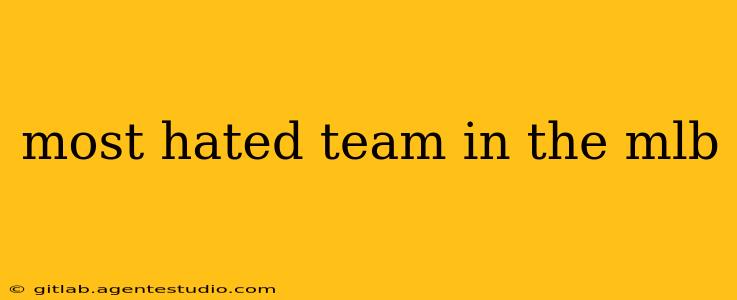Determining the single most hated team in Major League Baseball is inherently subjective. What ignites passionate disdain in one fan base might elicit a shrug from another. However, by analyzing historical rivalries, recent events, and the sheer volume of online chatter, we can identify strong contenders for the dubious title. This isn't about objectively "bad" teams; it's about the teams that consistently stir the most intense negative emotions among opposing fans.
The Usual Suspects: Yankees and Dodgers
Let's address the elephants in the room: the New York Yankees and the Los Angeles Dodgers. Their long and storied histories, coupled with consistent success (and, some would argue, a penchant for high-priced free agents), have made them perennial targets of fan animosity.
The Yankees' Reign of Terror (and Envy)
The Yankees' 27 World Series titles fuel a significant portion of their hatedom. Decades of dominance, punctuated by iconic players and legendary rivalries (think Red Sox!), have solidified their status as a lightning rod for negative sentiment. Their perceived arrogance and financial muscle only intensify these feelings. Fans of other teams often view the Yankees' success as unfair, fueled by an almost unlimited budget.
Dodger Blue: A Target of West Coast Ire
The Dodgers, while boasting a slightly less intimidating World Series win count, share a similar level of dislike. Their consistent competitiveness, coupled with a large and passionate fanbase, makes them a natural rival for numerous teams. Their high-profile players and frequent playoff appearances only add fuel to the fire, making them a frequent target for fans frustrated by their success.
Beyond the Giants: Other Contenders for the Title
While the Yankees and Dodgers consistently top "most hated" lists, several other teams frequently garner significant negative attention:
The Boston Red Sox: A Love-Hate Relationship
The Red Sox's intense rivalry with the Yankees alone ensures their spot on this list. Their history, marked by both triumph and agonizing defeats, makes their fanbase deeply invested – and often fiercely protective. This passionate loyalty translates to equally passionate dislike from their rivals.
The St. Louis Cardinals: A Legacy of Controversy
The Cardinals, despite their history of strong community ties and a dedicated fanbase, have also faced considerable backlash. Some fans perceive them as benefiting from favorable officiating or enjoying an unfair share of luck, leading to a simmering resentment among opposing fan bases.
The Houston Astros: The Cheating Scandal's Lingering Effects
The 2017 Astros' sign-stealing scandal irrevocably altered their public image. While the team has attempted to move past the incident, the lingering distrust and animosity from other teams’ fans remain substantial, cementing their place among the most disliked teams in MLB.
Analyzing the Factors Contributing to Hatedom
Several key factors contribute to a team becoming a target of widespread dislike:
- Consistent Success: Prolonged periods of dominance naturally breed resentment.
- High-Profile Players: Star players often become focal points of both admiration and animosity.
- Team Culture/Reputation: Perceived arrogance or a history of controversial incidents can significantly damage a team's image.
- Intense Rivalries: Historical battles and deeply rooted rivalries amplify negative feelings.
Ultimately, the "most hated" title is fluid and depends significantly on individual fan perspectives. However, by understanding the factors contributing to fan animosity, we gain a clearer picture of why certain teams consistently elicit such strong negative reactions. This passionate dislike, however, is a testament to the enduring power and emotional investment in the game of baseball itself.

